Unlocking medical research breakthroughs is a significant achievement. Yet, for Prof Elaine Leung Lai Han, a question remains: How can she transform these research findings into tangible outcomes with the support of angel investors, pharmacies, and hospitals? Join us on a journey as we delve into Prof Leung’s mission to empower members of the University of Macau (UM) in innovation and entrepreneurship.
Prof Leung is the head of the Centre for Innovation and Entrepreneurship (CIE) and a professor in the Faculty of Health Sciences at UM. Transiting from a dedicated researcher who solely immersed herself in laboratory work to a visionary familiar with fostering synergies across different industries and identifying potential investors, Prof Leung acknowledged that this journey was not easy and she faced numerous setbacks. Drawing from her own experiences, Prof Leung now aims to mentor aspiring UM members on their innovation and entrepreneurship journey through CIE.
Promoting the commercialisation of research outcomes
The Centre for Innovation and Entrepreneurship at UM is a national co-working space. It brings together more than ten teams of university students seeking to start their own businesses. These teams represent various fields, ranging from information technology to health care. However, they all share a common interest: to benefit from Prof Leung’s entrepreneurship stories and enhance their negotiation skills with investors.
In 2015, Prof Leung started to develop a ginseng polysaccharide health care product which, following clinical trials conducted by Kiang Wu Hospital in collaboration with four hospitals in the Greater Bay Area (GBA), was proved to double the efficacy of first-line PD-1/PD-L1 treatment for lung cancer. This breakthrough has significantly increased the survival rate among lung cancer patients. The product has been successfully registered in Macao. Moreover, its impact extends beyond the city as it is also used in larger-scale lung cancer treatment in neighbouring regions, benefiting numerous patients.
Upon learning about Prof Leung’s successful story, the students all looked at her with deep admiration, as if she possessed a halo of glory. They fully understood that translating research results into tangible outcomes, particularly in the biomedical field which involves clinical trials on patients, is a difficult task. Despite being held in high esteem by the students, Prof Leung humbly acknowledged that she encountered countless failures along the way. Securing investment proved challenging, with only one out of a hundred investors willing to support her projects most of the time. Her eventual success was actually the result of perseverance through numerous setbacks.
At present, Prof Leung is committed to assisting UM students, faculty and alumni in transforming their innovative ideas with commercial potential—especially their research results—into entrepreneurial projects.
Prof Leung shared, ‘Most of the time, I find myself sharing my experiences of failure rather than my successful projects. Every setback in negotiations with investors offers valuable lessons. I learn new negotiation skills and these practical experiences inspire me to strike a balance between commercial value and research value, which is also a philosophical question. Of course, the cooperation between the university and investors places the interests of patients as the top priority.’
Enhancing the success rate of investment lobbying
For Prof Leung, academic research holds significant importance. However, she believes that the significance grows even further if the research outcomes can benefit others. As a biologist, the concept of commercialising research outcome was initially beyond her expertise. To familiarise herself with this concept, she actively engaged with people from the business and medical sectors to gain insights into their perspectives.
Prof Leung shared, ‘It is crucial for researchers to understand the needs and circumstances of investors and users. This allows our research outcomes to better align with their needs and requirements. In a way, they are also our research subjects before we write a research proposal or start a study.’
The process of discussing the clinical study with the collaborating hospitals was still vivid in Prof Leung’s memory. Fully aware that there would be no second chances, she sought advice from individuals in the medical industry to understand the hospitals’ concerns. She also strategised how to present the effectiveness of her product in the most direct and efficient manner. ‘In addition to knowing my product, it is vital to understand my counterparty and be well prepared. This allows me to play my cards right and enhance the success rate of my lobbying efforts.’
According to Prof Leung, innovators and entrepreneurs should not only possess interpersonal skills, but also the ability to acquire knowledge across different disciplines. For example, the GBA presents numerous opportunities. But how can one establish a company in both Guangdong and Macao? What are the differences in intellectual property rights and patent systems between the two regions? It requires professional legal knowledge to answer these questions. In view of this, CIE provides regular training courses for incubating teams at the centre and encourages them to actively participate in innovation and entrepreneurship competitions, thereby gaining experience in pitching to investors.
Realising the direction of life
Pursuing an academic career demands considerable time and effort. Prof Leung is no stranger to this journey, as she also experienced self-doubt, questioning whether she should dedicate her prime years to scientific research. Born and raised in Hong Kong, Prof Leung already had a strong interest in biological sciences when she was a secondary student. In 2006, she successfully defended her doctoral dissertation at the Chinese University of Hong Kong (CUHK). While her supervisor congratulated her and told her to take time off and celebrate the accomplishment, the newly minted doctor returned to the laboratory the next morning and continued the cell culture experiments, leaving her supervisor astonished.
Prof Leung explained, ‘A lot of people had told me about the huge challenges of pursuing a research career and urged me to think carefully. But after passing my oral defense, I felt very unsettled. The idea of no longer being able to experiment with the cells in the laboratory and unravel the mysteries of DNA really upset me. It was at that moment that I realised the direction of my life.’
When asked about what kind of person is suitable for research, Prof Leung highlighted three essential qualities. The first is curiosity. Drawing from her own experience, Prof Leung said she has possessed an unwavering desire to get to the bottom of questions since childhood. The desire to uncover answers to scientific questions is crucial. The second quality is keen observation, which refers to the ability to notice very subtle or even imperceptible changes during the experiment process. It is often in these moments that groundbreaking discoveries are made. The third essential quality is perseverance. Research is a time-consuming endeavour, as it takes considerable time to complete each step. A researcher must remain determined and composed in the face of challenges.
Exploring the relationship between emotions and health
Despite juggling the roles of an entrepreneurship instructor, researcher, and teacher, Prof Leung finds great enjoyment in her busy lifestyle at UM. She embraces the daily hustle as she travels between CIE, laboratories, and classrooms at the university. Even though the hour before bed is her only time to unwind, she remains content and approaches every day with energy. Prof Leung said, ‘When you know the purpose of your life, you won’t feel empty. When you love your job, you find pleasure in it.’
As an accomplished researcher in biomedical sciences, Prof Leung understands the close relationship between emotions and health. According to her, bacteria account for about three kilograms of our body weight and have a direct impact on our well-being, which in turn affects our emotional state. ‘Our research team is going to start a study on the effects of cytokines or probiotics on people’s mood and health, and seek to provide a scientific perspective on the relationship between these factors. Similar to the concept in Chinese medicine where humans are viewed as an integral part of nature, by grasping the “Tao” of the human body, we can gain a deeper understanding of its physiological and pathological patterns,’ she explained.
Capitalising opportunities in the Greater Bay Area
The vibrant GBA gathers many world-class high-tech enterprises and start-ups, creating a massive consumption market and fostering innovative capabilities. As the head of CIE, Prof Leung encourages the entrepreneurial teams at UM to set their sights on the GBA, urging them to participate in this thriving market and explore new business opportunities.
In November 2023, Prof Leung led a team of UM students, faculty and alumni who aspire to start their own businesses on a field trip to the GBA. They visited outstanding high-tech enterprises and business incubators, including Huawei Kunpeng Research Centre, Shenzhen Bay Science and Technology Ecological Park, BGI Genomics, Hong Kong Science and Technology Parks Corporation, and Hong Kong Cyberport. The trip allowed UM members to gain insights into the successful start-up projects in the GBA and the region’s development potential.
Through UM’s resources and the professional support provided by various sectors of society, Prof Leung hopes to ignite and cultivate a culture of innovation and entrepreneurship within the university. She explained, ‘Our mission is to develop innovative capabilities, support start-up projects, and assist entrepreneurs in achieving success. To accomplish this mission, our centre provides comprehensive support and services for UM members. For example, we foster connections between people, technologies and industries and have developed mechanisms to nurture innovative talent. We also create opportunities for young people in the GBA to pursue their careers, so as to achieve our ultimate objective of “planning for the youth, planning for Macao, and contributing to the development of the GBA”’.
Profile of Prof Elaine Leung Lai Han
Prof Elaine Leung Lai Han is a professor in the Faculty of Health Sciences and head of the Center for Innovation and Entrepreneurship at the University of Macau. She is dedicated to research on targeted therapy for lung cancer and its mechanism of action. Prof Leung has published more than 170 SCI articles in international journals, including Nature (Outlook), Gut, JAMA Oncology, Nature Communications, Pharmacological Research, Pharmacology & Therapeutics, Oncogene, Cancer Letters, and British Journal of Cancer. She also serves as the editor-in-chief of the internationally renowned pharmacology journal Pharmacological Research (a top journal in Q1 in pharmacology with an impact factor of 9.3 in 2024). In addition, Prof Leung holds 42 international patents.
Prof Leung obtained her bachelor’s degree in Molecular Biotechnology at CUHK in 2001. She furthered her education at CUHK, receiving her master’s degree from the Department of Biochemistry in 2003 and her PhD degree from the Department of Physiology in 2006. In 2019, she won the first-class Natural Science Award from the Ministry of Education. In 2020, Prof Leung was honoured with the Young Qi Huang Scholar Award under the Traditional Chinese Medicine Inheritance and Innovation ‘Tens of Millions’ Talent Project.
Text: Kelvin U, Trainee UM Reporter Qiu Zichen
English translation: Bess Che
Photos: Jack Ho
Source: My UM Issue 131
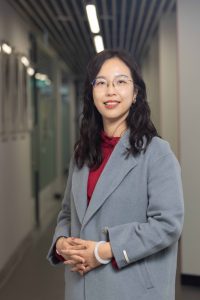
Prof Elaine Leung Lai Han
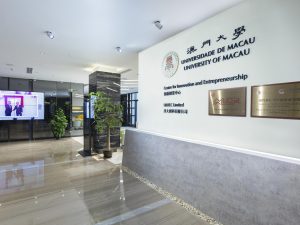
UM’s Centre for Innovation and Entrepreneurship is a national co-working space
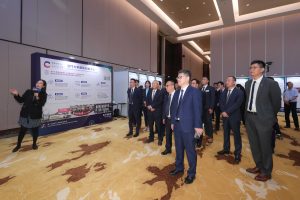
Prof Leung introduced UM’s start-up projects at the UM Innovation and Entrepreneurship Exhibition in 2023
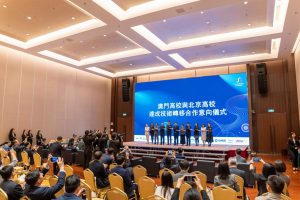
The UM Innovation and Entrepreneurship Exhibition facilitates multiple technology transfer cooperation projects between higher education institutions in Macao and Beijing
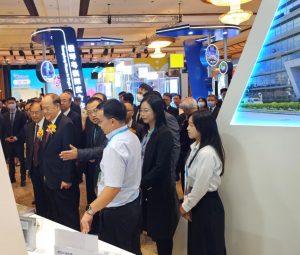
UM’s incubation results are showcased at the Macau Industrial Products Show, where the UM team introduces the results to the Chief Executive Ho Iat Seng and other guests
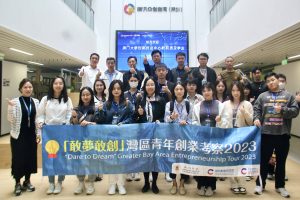
Prof Leung leads the UM entrepreneurial team on a field trip to the GBA
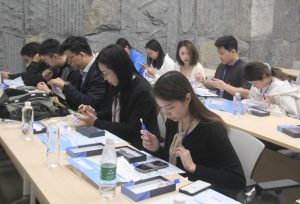
The UM entrepreneurial team experiments with DNA testing at BGI Genomics
